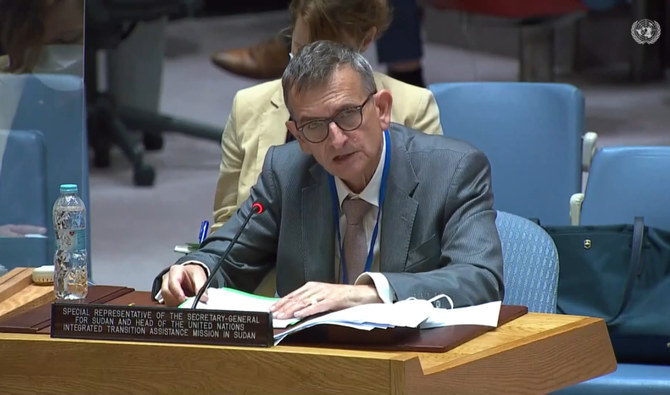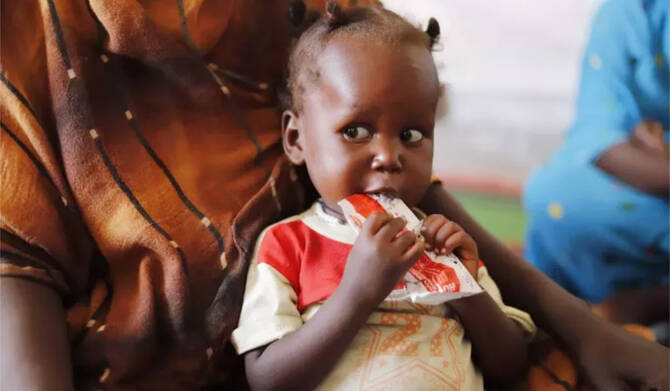Ephrem Kossaify
NEW YORK: The UN on Tuesday urged the ruling authorities in Sudan to reassure the public that they support dialogue as the only way to reach a political solution to the unrest in the country.
Volker Perthes, the special representative of the UN secretary-general for Sudan, said that to get the political transition in the country back on track, the authorities first need to release remaining detainees, halt arbitrary arrests, and lift the state of emergency.
Time is running out for a political solution that can chart a path out of the current situation, he added, which remains precarious and with much at stake, including the country’s political, social and economic stability.
Perthes was speaking during a meeting of the Security Council to discuss the latest developments in the African country, a few days after another peaceful protester was killed by the authorities. The number of demonstrators killed since the military coup on Oct. 25 last year now stands at 96.
“If the authorities want to build trust, it is essential that those responsible for violence against protesters be held to account,” Perthes said.
UN Secretary-General Antonio Guterres’s latest report on Sudan stated that the lack of political agreement and of a “fully credible” government is affecting the security situation.
The Security Council meeting also came in the wake of armed clashes between Arab and Masalit communities in Kereneik, West Darfur, in April during which, initial reports suggested, 150 people were killed, many more injured, thousands displaced, and homes, a police station, a hospital and a market were burned down.
Perthes welcomed the decision by armed groups and regular forces to accept the Permanent Ceasefire Committee, chaired by the UN mission in the country, as a joint institution to help bring the conflict under control but warned that despite this, “the risk of a new outbreak of violence remains high.”
Although he welcomed the recent release of 86 detainees as an important step toward creating conditions conducive to rebuilding trust, he stressed that at least 111 people are still being held in Khartoum, Port Sudan and other cities.
Peaceful protests continue in Sudan amid public demands for change and the restoration of the democratic transitional process, even as several political parties and coalitions form new alliances and put forward proposals for talks with rivals.
“As Sudan continues to confront further uncertainty, the shared sense of urgency, combined with their vision for a better future, is driving many parties to seek common ground and increasing openness to dialogue,” Perthes told the members of the Security Council.
“There is also a growing recognition of the need for civilian-military dialogue.”
However, he added that some key stakeholders continue to reject calls for face-to-face talks with their counterparts and prefer to participate indirectly. For that reason, on May 12 the UN launched indirect talks to address a number of core issues, including “the term and composition of key constitutional organs, the future relationship between the military and civilian components, and the mechanism and criteria for the selection of a prime minister.”
Once an understanding is reached on such issues, Perthes said a trilateral mechanism that includes the UN, the African Union, and the Intergovernmental Authority on Development, an eight-country African trade bloc, will convene for negotiations.
He warned, however, of “‘spoilers,’ who do not want a peaceful transition to democracy or refuse a solution through dialogue. The Sudanese parties should not allow such spoilers to undermine the opportunity of finding a negotiated exit to the crisis.”
The envoy also stressed that the protection of civilians requires the root causes of the conflict to be addressed, including decades of marginalization, land issues, and the return of internally displaced persons and refugees.
The political stalemate, combined with an economic crisis, poor harvests and global supply shocks, continues to exact a heavy socioeconomic toll on Sudan, where humanitarian needs are incessantly growing amid a 250 percent increase in food prices. According to the UN, the number of people in the country facing acute hunger is projected to double to about 18 million by September this year.
Perthes lamented the fact that the 2022 humanitarian response plan for Sudan has only received “an abysmal” 13 percent of funding, with international donors and financial institutions balking at providing assistance that goes through state systems in the absence of a political agreement to restore constitutional legitimacy.
“While the primary responsibility for these changes lies with the Sudanese stakeholders themselves, I am concerned about the long-term consequences as we watch the further erosion of Sudan’s already fragile state capacity and human capital,” he said.
He also warned that some of the critical assistance from the World Bank Group’s International Development Association 19 that is allocated to Sudan will go to other countries by the end of June if a political agreement cannot be reached in the country by then.
“If a solution to the current impasse is not found, the consequences will be felt beyond Sudan’s borders and for a generation,” Perthes said.






















